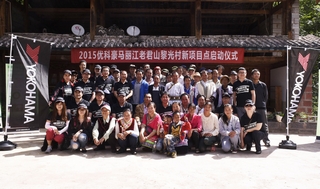Yokohama begins stage 2 of China eco project

Yokohama Rubber Co. Ltd. photo) Participants mark the continued ecological preservation project in the Heyuan Village inside the Laojun Mountain Nature Reserve near Lijiang City in China’s Yunnan Province.
Yokohama Rubber Co. Ltd. has begun the second stage of its ecological preservation project in the Heyuan Village inside the Laojun Mountain Nature Reserve near Lijiang City in China’s Yunnan Province.
The Tokyo-based tire maker said its Yokohama Rubber (China) Co. Ltd. holding company is participating in the operations in China. The project’s first stage ran from 2011 through 2014, with activities focused on the Heyuan Village inside the Laojun Mountain Nature Reserve. Second stage activities were launched on June 25, 2015, in the Liguang Village, with employees from Yokohama Rubber (China) involved.
The ecological preservation project in the Laojun Mountain area is a unique endeavor to preserve the local ecology, according to Yokohama, by transforming rural villages where the only previous means of earning a living was to cut down trees and engage in other activities that led to deforestation into villages with economies based on agriculture and livestock.
The project was first advocated in 2010 by the Beijing SanSheng Environment and Development Research Institute, a Chinese environment NGO. Yokohama said it has been an active supporter of the project since it began in 2011.
The project in Liguang Village will follow the same steps taken at Heyuan Village. In the project’s first year in Heyuan, a “Village Bank” was established to provide financing needed to transform the village economy from deforestation to agriculture and livestock rearing, Yokohama said. Also, “the Laojun Mountain Heyuan Natural Ecosystem Industry Cooperative” was set up to promote research on agriculture and livestock production.
In 2012, the second year, the project began providing financial support to cover the cost of sending children to school for families whose income had been temporarily reduced by the transition to a more environmentally friendly agriculture-based village economy. Third-year activities focused on the donation of equipment needed for processing agricultural and livestock products, such as beekeeping equipment.
Yokohama said last year the project saw the establishment of the “Sales Platform of Ecological Agricultural & Forestry Products” to help villagers reap an economic profit from the fruits of their new efforts.
As a result of the program’s activities over the past four years, as of this past March the tire maker reported that 63 percent of village households have started up new ventures with financing from the Village Bank, and approximately 7,500 acres of forest land have been protected by a deforestation ban established by the village residents.
Yokohama said it has been a staunch supporter of the project’s activities, providing materials as well as financial aid.
Related Article
- Here comes the worst situation in Chinese passenger vehicle market for 15 years
- China’s polymer imports up in H1 except for homo PP, PS
- TOCOM rubber rebounds on position adjustments after 3 days of losses
- Price Update of NR in QDFTZ on July.30, 2015
- Chinese automakers see in new normal with reducing inventory while expanding capacity
- Tireworld Insight: Domestic tire makers eye overseas expansion
- Tireworld Insight: Price disparity severe between China's rubber exports and imports
- Tireworld Insight: China tire exports dependent on US market performance
- Tireworld Insight: SHFE rubber expected to move in tight range in short-term
- Tireworld Insight: Rubber futures to test near-term resistance at 15,000 yuan/tonne
- Tireworld Insight: China’s tire industry on track of rapid growth






